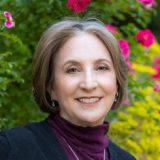I have always been Jewish–at least culturally. Yiddish, Jewish music, and of course Jewish food were evident in my home and that of my great grandparents who came from the “old country.” Although I didn’t have a bat mitzvah and usually attended services just on the High Holidays, I did go to a Reform Sunday school in a Boston suburb through confirmation, post-confirmation, and post-post-confirmation. Complexities regarding biblical heroes and stories were kept to a minimum in the telling; oppression, exile, and liberation were the order of day. I was blissfully ignorant of how little I knew. But this never really bothered me. My only conundrums: how to combine the positive pride at being “chosen” with the stigmatized identity of the oppressed and ostracized. And I was never quite sure if being a Jew was a matter of faith or of culture.
About ten years ago, a non-Jewish friend told me about a course of Jewish study she was taking with her (Jewish) husband: two years of weekly three-hour meetings, and as much as seven hours of homework reading… a week! Now that was commitment. She spoke knowingly using words like “redacted” and “theodicy.” I had been living comfortably with my Judaism, with the heroes and the simplified history of my youth. As I spoke with her, I came to realize how little I really knew–or understood. So, yes, embarrassment, coupled with curiosity and a natural attraction to ideas of all types led to piqued interest. But there were so many other things to study, to do. Someday, perhaps, I’d enroll in such a program.
Fast forward several years: a member at my synagogue mentioned Me’ah and the hope that Temple members would participate. He was in his second year of study and raved about it, reassuring me that the readings were not as extensive as I imagined. By now I was motivated and had the time to engage in Judaism catch-up. I signed up as soon as the announcement came out for the next class, knowing there was usually a waiting list. I started Me’ah with the Coolidge Corner Collaborative in 2011.
Although I had some idea of the structure and format of the program, I was not prepared for what I got. I knew that there were four periods of study, one for each semester: Biblical, Talmudic, Medieval, and Modern, each taught by an expert. I did not expect to experience such passion from professors. Their love of Judaism and its rich tradition was deep and permeated every class. Biblical stories turned out to be more complicated than I ever imagined; the Talmud with its terse and laconic style was definitely a challenge, helped along with “chavruta” or a kind of study-with-a-buddy. Moving through the Medieval and Modern periods we were exposed to giants of Jewish learning and practice, as well as ongoing adaptation, dispersal, and survival—against all odds. Our gifted teachers, with their beautifully prepared set of readings, brought many ideas and debates for us to consider. They were not simply intellectual powerhouses; what they imparted to us was much more than information or compelling ideas. They were exemplars, and their passion, commitment, and humility were a precious gift. They invited and appreciated our opinions as if we were at their level. It was the inspiration of their very being and the opportunity to study with other like-minded people that has connected me to our tradition in a meaningful way.
I may not remember all the details or debates, had all my questions answered, or understood God or how prayer fits into my life. I’m still still working on it, and I look forward to a future filled with the wonders of Jewish learning.
–2013 Me’ah graduate
This post has been contributed by a third party. The opinions, facts and any media content are presented solely by the author, and JewishBoston assumes no responsibility for them. Want to add your voice to the conversation? Publish your own post here. MORE


